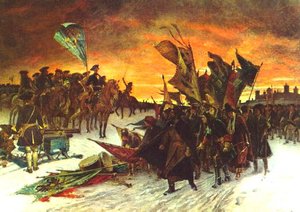Battle of Narva
|
|
 The Swedish Victory at Narva, 1700 by Gustaf Cederström, painted 1910 | |||||||||||||||||
| Battle of Narva | |||||||||||||||||
|---|---|---|---|---|---|---|---|---|---|---|---|---|---|---|---|---|---|
| Conflict | Great Northern War | ||||||||||||||||
| Date | November 20, 1700 | ||||||||||||||||
| Place | Narva, northeast Estonia | ||||||||||||||||
| Result | Decisive Swedish victory | ||||||||||||||||
| |||||||||||||||||
The Battle of Narva was an early battle in the Great Northern War in which a Swedish army under King Charles XII of Sweden defeated the Russian army of Tsar Peter the Great at Narva. It was a stunning Swedish tactical victory.
The battle
On November 20, 1700 (Julian calendar) the 8,140 man strong main force under King Charles XII engaged the Russian Army that was besieging the Swedish (now Estonian) city of Narva. The main Swedish force was assisted by around 2,500 men from within the city. The Russian army had great numerical superiority, numbering about 37,000 troops. Swedish sources from the time, still quoted in some literature, claimed that the Russians numbered 80,000 to 100,000; this might be reasonable numbers when including the Russian support machinery of civilians, soldiers' wives and families.
The Swedish Army was commanded by the king himself, assisted by General Carl Gustav Rehnskiöld, and the Russian Army was commanded by Charles Eugène de Croy. Tsar Peter had left the army just days before.
The Swedish Army went into action at noon, protected by a blizzard blowing into the Russians' eyes, blinding them. The Swedes broke through the Russian lines and put the entire Russian army in a panic.
The casualties were relatively high for both sides, but the battle was a great Swedish victory. Sweden lost only 667 men (almost 10%) and the Russian army lost about 15,000 men, many of whom fled the battlefield, only to drown in the Narva River.
The remaining Russians capitulated and were given full quarter after turning over their weapons. Over 20,000 muskets were turned over to the Swedes.
Aftermath
Ironically, this battle is a perfect illustration of the proverb: you can lose a battle but still win a war. This giant defeat was one of the reasons Peter the Great decided to pursue a crash reform program, modernising the Russian military. In just a few years, the new Russian army would be a much tougher opponent. On the other hand, this great victory was wasted by Charles, who instead of pursuing the Russians decided - against advice of his generals, diplomats of Swedish parliament - to turn against the Polish-Lithuanian Commonwealth, even though it has been suing for peace. Over the next several years Charles would dethrone the Polish king, Augustus II of Poland, but given that breathing space, Russian Tsar Peter the Great managed to create an army that defeated the Swedes at the battle of Poltava, forever ending the dominance of the Swedish Empire, and marking the rise of the Russian Empire.fr:bataille de Narva no:Slaget ved Narva ru:Битва при Нарве fi:Narvan taistelu sv:slaget vid Narva de:Erste Schlacht von Narva nn:Slaget ved Narva
